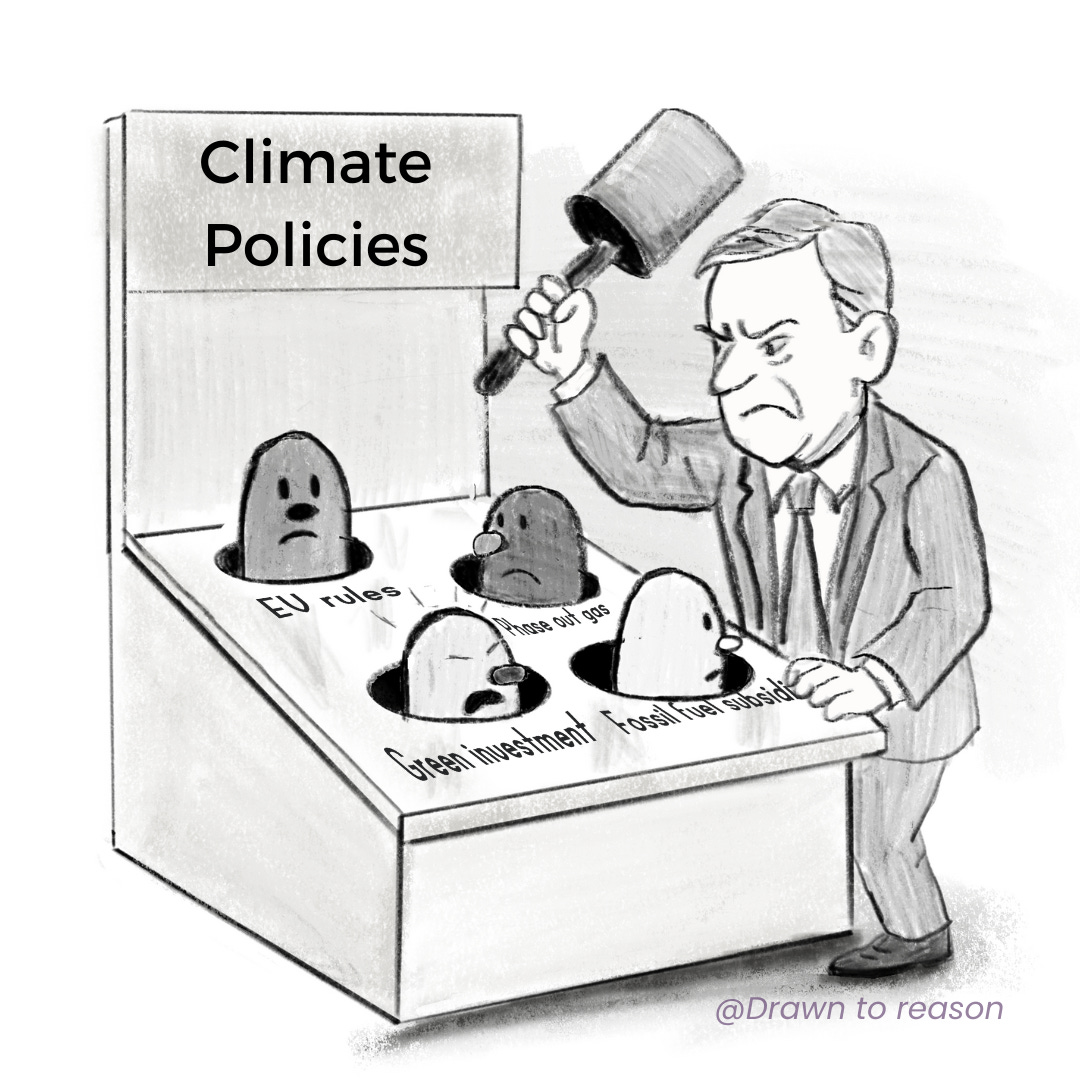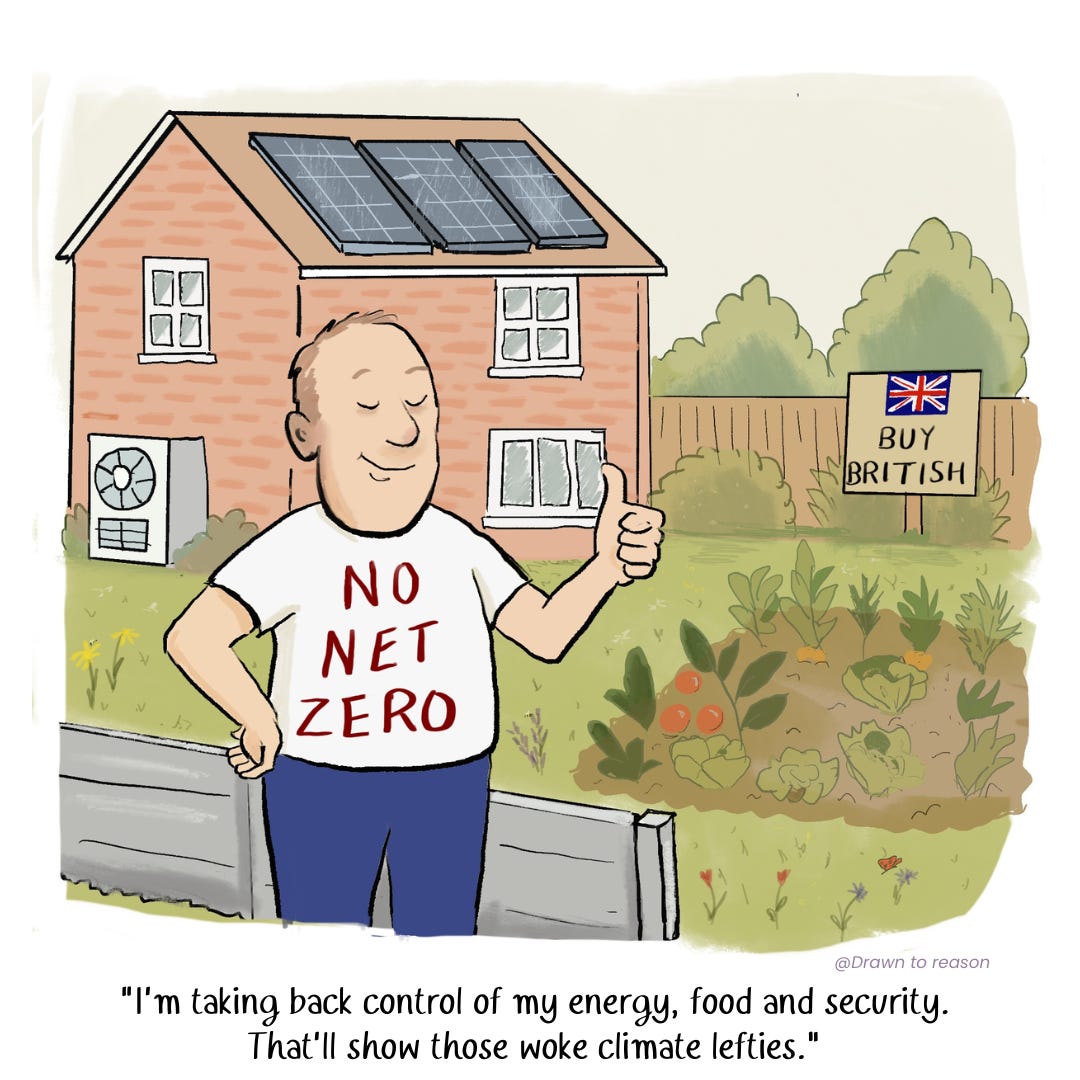Communications That Work in Sustainability

It's a lovely win when you discover someone's writing, and it just hits the mark from the first moment you read it.
Dr. Sandra Lee is hugely experienced climate strategist, working in academic, government and commercial sectors delivering carbon literacy training, toolkits and workshops that spark action not anxiety.
Already a full time employee working for the University of Leicester, she's somehow managed to squeeze some extra time to develop her own writings which she is starting to feature on her Substack.
In addition, her cartoon and infographic work is rising in popularity, as she doodles beautiful cartoons which make climate communications easier to absorb.
We spoke to Sandra this week and she's given permission for us to reprint her outstanding writing in full, for you all to connect with.
To get more of her work, you can subscribe to her Substack here and sign up for the unique FREE toolkits here.
Reprinted with permission. ⬇️⬇️⬇️⬇️⬇️⬇️⬇️⬇️⬇️⬇️⬇️

Net Zero is trending again — but not in a good way.
We know only 12% of the UK population report being ‘strongly opposed’ to the government’s Net Zero targets1, yet this vocal minority dominates online discussion.
To be fair, how many of us can actually define it? Not even the Government if their own strategy is anything to go by.
My current work with local authorities — many of whom led the charge on climate emergency declarations and decarbonisation strategies pre-pandemic — now reflects a shifting reality. Following recent elections, Net Zero has become a political liability in some councils, no longer a strategic imperative and, in some cases, not even to be mentioned for fear of programmes being cut.
It’s distressing to see the discomfort, even fear, in their faces. To hear their stories - one colleague was facilitating the excellent ‘How Bad are Bananas?’ game at an event when a Council member approached them in disgust and warned loudly that they needed to start looking for a new job.
Suddenly, what was difficult has become almost impossible. How did we get here?
Media vs Net Zero: like a sitcom, if you squint
Let’s set the scene: the media is reporting Net Zero like ChatGPT trying to explain a policy U-turn — vaguely convincing, occasionally brilliant and often completely made up.
1. Headline whiplash
When Rishi Sunak quietly watered down the UK’s Net Zero targets in 2023, the media ricocheted between outrage, spin, and shrugging indifference. One day Net Zero was a legal duty, the next, it was framed as a lifestyle choice2.
2. Populist plot twists
Enter “anti-Net Zero populism” — where heat pumps are class war and ULEZ is tyranny. Green pledges stall. Oil licences slip through. Net Zero (‘woke’ now apparently) becomes the punchline for anything unpopular3 4.
3. Editorial echo chambers
In 2023, Carbon Brief found that right-leaning outlets quadrupled their anti-climate content 5. Meanwhile left-leaning press called for faster action. Two separate narratives - both shouting, neither listening.
4. Ed vs the world
Somehow, Ed Miliband (the guy that went viral eating a bacon sandwich) got blamed for the collapse of British steel — because apparently Net Zero did that6.
In truth, clean energy infrastructure could actually revive manufacturing, but who reads past the headline?
5. Government in disarray
The real kicker? Ministers champion Net Zero one day, then approve oil and gas licences the next. It’s not public opinion they’re responding to — it’s influence. And influence rarely comes cheap.

What does this tell us?
Net Zero hasn’t failed as a goal — but it has been hijacked as a narrative and it’s impacting the trust people have in the whole climate action narrative7
Let’s rewrite the story — one grounded in reality, values and everyday choices.
No villains. No drama. Just the future we actually want to live in.
Wait - my content isn’t doom and gloom!

What if this isn’t a dead end? What if it’s a chance to reroute the conversation?
We know that the majority of the UK public remains concerned about climate change — including more than half of Reform UK voters8; they’re just not shouting about it online.
This isn’t apathy - it’s a sign that we need to change how we talk.
The backlash against Net Zero doesn’t mean climate action is doomed. It means the message isn’t landing, and that gives us a rare opportunity to do something smarter.
Don’t mention net zero!
“I might have mentioned it once but I think I got away with it”
Post-meeting debriefs are now reminiscent of Basil Fawlty failing to keep order while the kitchen's on fire and the guests are revolting.
What people want to know isn’t how we’re going to reduce emissions by 78% by 2035 and whether that includes scopes 1, 2 and 3 - they want to know:
- Why are my energy bills still so high?
- Is solar actually cheaper?
- Can I afford to heat my home this winter?
The really switched on (pun intended) may also ask:
- Do we have to keep relying on Russian gas pipelines?
- Will there be enough electricity for EVs, data centres and heat pumps?
- Is the grid ready for what’s coming?
In short, the public isn’t asking about Net Zero. They’re asking how to keep the lights — and the WiFi — on.
So why the negative net zero noise?
The GreenerFuture Leicestershire project I’m currently working on, included a 2025 report by Energy Systems Catapult, who carried out a social listening study of the platform X (formerly Twitter, now mostly just a bin fire with branding) to track public engagement with energy-related topics. Since X skews right and loud, it offers insight into who’s shouting — not what most people think.
That said, the patterns are revealing:
- Mentions of “Net Zero” rose by 273% in 2024
- Posts opposing climate action generated far more engagement than those in support
- Most users didn’t engage at all — not because they disagreed, but because the framing didn’t speak to them.
What does all this online noise miss?
The fact that most people aren’t arguing about emissions targets; they’re asking if they can afford to put the heating on.
And beneath all that? A bigger shift most of us haven’t clocked yet.
Our demand for electricity is about to explode — not because of woke ideology or net zero conspiracies, but because our lives are changing.
We’re swapping gas boilers for heat pumps, petrol cars for EVs, filing cabinets for servers and administrators for ai chatbots. Your fridge might not care, but the grid does.
The electricity demand story
This isn’t about Net Zero. It’s about not running out of power.
Away from politics and polar bears, the piece that we can all relate to is that the UK’s electricity demand is projected to double by 20509.
That’s not because of climate policy. It’s because:
- Homes are switching to electric heating
- Cars are switching to EVs
- AI, data centres and digital infrastructure are hungry for power
- Industry wants out of volatile fossil markets
This shift is coming whether we reach Net Zero or not. The real question is: how do we power it?
Even Reform voters want action — just don’t call it Net Zero
Here’s the twist: even the loudest critics of Net Zero don’t want to be left without flood defences, drinkable water or functioning supply chains. In fact, polling 10 shows a surprising level of support for climate adaptation — even among voters who reject “climate change” as a priority issue.
So maybe that’s our “Don’t mention Net Zero” moment again.
If adaptation is the shared ground, let’s start there:
- Not with carbon budgets, but with blocked drains and broken supply chains.
- Not with global models, but with the soggy school run and the empty salad aisle.
Even if we disagree on why the climate is changing, we can still agree on not drowning in it.

How to use this in storytelling and values-led campaigns
As discussed in Issue 1, facts don’t move people — stories do. The stories that resonate are the ones that connect with what people value. Values-based communication is critical if we want to cut through noise and polarisation.
Map climate to core values
Depending on your audience, reframe climate action as:
Core Values
- Security - “Reliable energy that protects you from price shocks”
- Fairness - “No one should freeze while big suppliers post record profits”
- Stewardship - “Leaving a better system behind, not just cleaner air”
- Ingenuity - “Upgrading to smarter tech, cleaner power, local jobs”
- Independence - “Homegrown energy, not foreign gas”
If your goal is behaviour change or public support, don’t just ask people to care about emissions. Give them a reason that matches their values.
What works
Start with shared needs, not climate jargon
“Everyone wants to stay warm, keep the lights on and cut waste.”
- Frame change as control, not sacrifice
“Switching to clean energy means more control over your bills, not less comfort in your home.”
- Use emotionally grounded, everyday examples
“Meet Sarah from Norwich. Her solar panels and insulation cut her bills by 25% last winter.”
- Speak to identity and aspiration
“This isn’t about being green. It’s about being smart, prepared and future-fit.”
- Anchor abstract goals in local realities
“Doubling electricity demand isn’t theoretical. It’s happening on your street, in your workplace and at the plug in your hallway.”
Here’s a quick reference for communicators and campaigners to maximise your reach:
Final take: Has Net Zero had its day?
Net Zero as a target still matters, but as a message, it’s lost its charge.
Let’s stop trying to win the culture war and start powering the future — affordably, reliably and cleanly.
That’s the message that keeps the WiFi on.
1 https://yougov.co.uk/politics/articles/48161-net-zero-views-uk-opinion
2 https://www.cision.co.uk/resources/white-papers/how-media-reacted-rishi-sunak-net-zero-policy/
3 https://www.tandfonline.com/doi/full/10.1080/13876988.2023.2242799
4 https://www.theguardian.com/environment/2025/jun/15/tories-reform-net-zero-climate-science
5 https://www.carbonbrief.org/analysis-record-opposition-to-climate-action-by-uks-right-leaning-newspapers-in-2023/
6 https://www.theguardian.com/business/2025/apr/14/rightwing-media-blames-ed-miliband-uk-steel-crisis-net-zero
7 https://www.nesta.org.uk/blog/public-attitudes-to-net-zero-and-climate-change-are-evolving/
8https://www.gov.uk/government/statistics/public-attitudes-tracker-spring-2023
9 https://www.nationalgrideso.com/document/294591/download
10 https://www.gov.uk/government/statistics/public-attitudes-tracker-spring-2023
Read more articles from Dr Sandra Lee and her amazing FREE toolkits for sustainability professionals here;

Republished with permission from Dr Sandra Lee full rights remain with the author.

